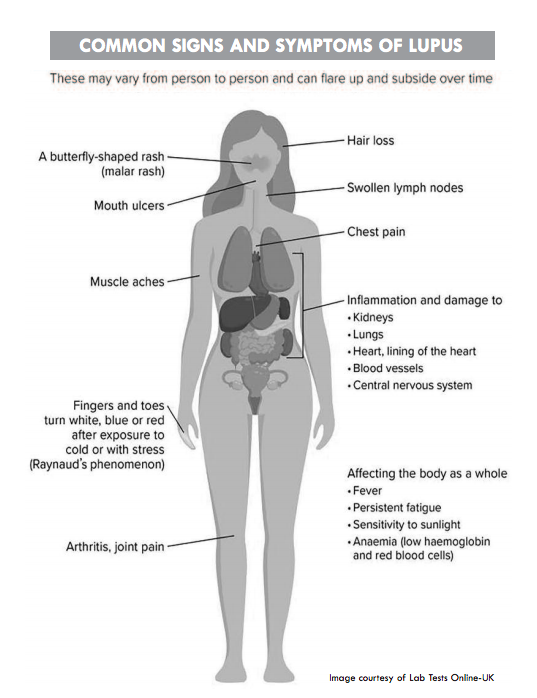BSR Guideline for the Management of Systemic Lupus Erythematosus
This site is intended for healthcare professionals as a useful source of information on the diagnosis, treatment and support of patients with lupus and related connective tissue diseases.
BSR Guideline for the Management of Systemic Lupus Erythematosus
The British Society for Rheumatology published the executive summary and the full guideline for the management of lupus on the Rheumatology (Oxford) journal website on 6th October 2017 and the executive summary was published in the paper version of the journal in January 2018. The guideline is a valuable resource for anyone managing patients with lupus as it covers all aspects of care from diagnosis and assessment, to monitoring of the disease and its treatment. For the benefit of patients being managed worldwide, it was published on-line open access so is available to anyone with an internet connection. The executive summary provides the main recommendations, with the levels of evidence and grades of recommendation and a table summarising treatment of mild, moderate and severe lupus with examples of these levels of disease activity.The full guideline provides more information on the specific recommendations in each main section (diagnosis, assessment, monitoring, treatment of mild, moderate and severe disease) and also provides a succinct summary of the main issues to be considered as an introduction to the scientific evidence supporting each recommendation. There is a conclusion about the quality of the evidence at the end of each item discussed. For the busy reader wanting key information, these should be read first, saving the detailed evidence on each topic covered for review when further information is required. There are also tables in the text that summarise the key evidence supporting the recommendations.
The initial diagnosis section emphasises the need for evidence of at least one serological abnormality (autoantibody or low complement level) and at least one clinical feature consistent with lupus being present. This ensures that a patient with a diagnosis of lupus has clinical features due to a disease process involving autoantibodies, immune complex deposition and complement consumption. In the absence of such features that characterise the autoimmune disease that we call lupus, it is not likely that the advice on treatment and monitoring will apply and other potential diagnoses should be considered before planning treatment.
The assessment section provides examples of mild, moderate and severe lupus features that are relevant to planning therapy. There are tables in the main guideline and links on line to the supplement providing all the supporting information about the classification criteria for lupus and the disease activity instruments that may be required, particularly for managing patients with severe disease that might be considered for biological therapy such as belimumab or rituximab (use of these treatments must comply with NICE and NHS England policies in England). These current policies are summarised in Figure 1 of the full guideline and references to the full documents are provided.
The monitoring section covers the further management of patients with lupus in terms of assessing the disease at regular intervals and distinguishing features of disease activity from complications of therapy or co-morbidities.
The treatment sections cover the use of UV protection and the drugs used to treat mild, moderate and severe lupus disease with the main emphasis on the management of non-renal disease and the evidence for this. In addition, the main EULAR recommendations for the management of lupus nephritis are provided in a table, with reference to the publication, for the evidence for these recommendations that had been published close to the time that these guidelines were being planned.
Finally, there are sections on implementation of the guideline, key standards of care and a research agenda. The key standards of care stress the importance of providing patients with personalised advice from a multi disciplinary team including specialist nurses and an individual to contact in the event of new symptoms. Patients need to be counselled about the benefits and risks of any treatment, the expected time frame for treatment to take effect, dose adjustments to minimise corticosteroid usage, as well as encouragement to discuss and plan pregnancy and the need for appropriate contraception. Additional topics mentioned include general health measures of particular importance to lupus patients due to their increased risk of complications from the disease and its treatment including reducing risk factors for atherosclerosis, osteoporosis, infection and cancer, such as not smoking, appropriate diet, need for vitamin D3, relevant exercise and advice to promote immunisations and cancer screening. These are not part of the main recommendations as there is very little lupus specific evidence that management of these conditions is different to that of the general population, but it is important that these issues are addressed to reduce morbidity and mortality in lupus patients.
References
Gordon C, Amissah-Arthur M-B, Gayed M, Brown S, Bruce IN, D'Cruz D, Empson B, Griffiths B Jayne D, Khamashta M, Lightstone L, Norton P, Norton Y, Schreiber K, Isenberg D. The British Society for Rheumatology guidelines for the management of systemic lupus erythematosus in adults: Executive summary. Rheumatology (Oxford) 2018;57(1):14-18
Gordon C, Amissah-Arthur M-B, Gayed M, Brown S, Bruce IN, D'Cruz D, Empson B, Griffiths B Jayne D, Khamashta M, Lightstone L, Norton P, Norton Y, Schreiber K, Isenberg D. The British Society for Rheumatology guidelines for the management of systemic lupus erythematosus in adults.Rheumatology (Oxford) 2018; 57(1):e1-e45
NICE. Belimumab for treating active autoantibody-positive systemic lupus erythematosus: Technology Appraisal Guidance [TAG397].
https://www.nice.org.uk/guidance/ta397
NHS England. Interim clinical commissioning policy statement: rituximab for the treatment of systemic lupus erythematosus in adults (reference NHS England A13/PS/a). https://www.england.nhs.uk/comissioning/wp-content/uploads/sites/12/2013/10/a13-ps-a.pdf
Prof Caroline Gordon
Emeritus Professor of Rheumatology Rheumatology Research Group
Institute of Inflammation and Ageing
University of Birmingham
Honorary Consultant Rheumatologist
City Hospital
Sandwell and West Birmingham Hospitals NHS Trust


 ©2024 LUPUS UK (Registered charity no. 1200671)
©2024 LUPUS UK (Registered charity no. 1200671)